Status and governance
As it exists primarily for the benefit of the members of a profession, BAFF is not a registered charity. The Steering Group which took BAFF to formation stated that the Federation would "not seek to supplant the role of any existing charity or other agency involved in service welfare." [1]
Neither is BAFF a trade union. The Steering Group seemed at pains to stress that the organisation would not be a trade union. In any case, although Regular service personnel are permitted by Queen's Regulations to join civilian trade unions or professional associations in order to enhance their trade skills and professional knowledge and as an aid to resettlement, armed forces personnel are specifically excluded from the definition of "workers" for the purposes of British trade union legislation. A body set up to represent such personnel cannot, therefore, register as a trade union under the Trade Union and Labour Relations (Consolidation) Act 1992. [2]
BAFF is registered with the Information Commissioner as a data controller, under its Company name BAFF (2006) Ltd and the operating name "British Armed Forces Federation". BAFF is regulated by the UK Ministry of Justice in respect of regulated claims management activities.
BAFF is managed by an elected Executive Council of 15 members. [3]
Criticisms and controversies
In the course of evidence to a House of Commons Committee [9] in February 2006 the Chief of Defence Staff of the time, General Sir Michael Walker (now Lord Walker of Aldringham) argued that
If we had a set of Armed Services that reacted to every whim of every influential group in it, we would get nowhere in delivering military capability for this country, so I believe that the chain of command must do that business. The Armed Forces Pay Review Body does look after the conditions and pay concerns and we would certainly lose the AFPRB and I am not sure we would get as much attention from the Government in terms of rewarding people. [10]
Sir Michael went on to give the example of an unspecified national contingent which, while he was in command in Bosnia, had (he told the Committee)
laid down its arms because, it said, the pay deal was not right, so they put their arms down. Do you really see British Armed Services doing that? That is the sort of trouble you get into when there is a representative body who are fighting back at home, your soldiers are at the front and they do not appear to be achieving. [10]
Speaking in an Armed Forces debate in the House of Lords in June 2006, Field Marshal Lord Inge acknowledged a "growing demand for a military federation or union", but went on to pose the rhetorical question "whether those [armed forces] who have federations and unions have ever won". [11]
A report [12] published in November 2007 by the British think tank Demos commented that
Perhaps the most distinctive development over the last decade has been the launch of the British Armed Forces Federation (BAFF) as an independent campaigning professional association for serving and retired service personnel... The response of senior commanders to the creation of BAFF and their criticism set out for the House of Commons Select Committee has been mixed. While some senior commanders have argued that any independent organisation designed to ‘fight for the rights’ of British troops is completely unnecessary and threatens a dangerous breakdown of military discipline, others, such as the late Lord Garden, a former RAF Air Marshal..., have been ‘surprised talking to retired senior military people who are prepared to think about it, saying there might be a case for it’. [13]

The Netherlands Armed Forces are the military services of the Kingdom of the Netherlands. The core of the armed forces consists of the four service branches: the Royal Netherlands Navy, the Royal Netherlands Army, the Royal Netherlands Air Force and the Royal Netherlands Marechaussee. The service branches are supplemented by various joint support organisations. In addition, local conscript forces exist on the Dutch Caribbean islands of Aruba (AruMil) and Curaçao (CurMil). These operate under the auspices of the Royal Netherlands Navy and the Netherlands Marine Corps. The armed forces are organisationally part of the Ministry of Defence.

The British Armed Forces, also known as His Majesty's Armed Forces, are the military forces responsible for the defence of the United Kingdom, its Overseas Territories and the Crown Dependencies. They also promote the UK's wider interests, support international peacekeeping efforts and provide humanitarian aid.

The Canadian Armed Forces are the unified military forces of Canada, including sea, land, and air elements referred to as the Royal Canadian Navy, Canadian Army, and Royal Canadian Air Force.

The Ministry of Defence is the department responsible for implementing the defence policy set by His Majesty's Government, and is the headquarters of the British Armed Forces.

The Irish Army, known simply as the Army, is the land component of the Defence Forces of Ireland. Approximately 7,300 people served in the Irish Army on a permanent basis as of May 2016, and there were 1,600 active reservists, divided into two geographically organised brigades. By late September 2020, this had reduced to 6,878 permanent army personnel.

The Defence Forces are the armed forces of Ireland. They encompass the Army, Air Corps, Naval Service, and Reserve Defence Forces.

The Common Security and Defence Policy (CSDP) is the European Union's (EU) course of action in the fields of defence and crisis management, and a main component of the EU's Common Foreign and Security Policy (CFSP).
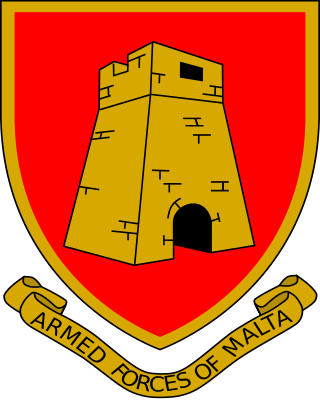
The Armed Forces of Malta is the name given to the combined armed services of Malta. The AFM is a brigade sized organisation consisting of a headquarters and three separate battalions, with minimal air and naval forces. Since Malta is the guardian of the European Union's most southerly border, the AFM has an active role in border control.
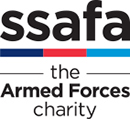
SSAFA – the Armed Forces charity, the Soldiers, Sailors, Airmen and Families Association, is a UK charity that provides lifelong support to serving men and women and veterans from the British Armed Forces and their families or dependents. Anyone who is currently serving or has ever served in the Royal Navy, British Army or Royal Air Force and their families, both regulars and reserves, is eligible for their help.

The Reserve Defence Forces (RDF) are the combined reserve components of the Irish Defence Forces. The RDF is organised into the First Line Reserve (FLR) and an active Second Line Reserve. The First Line Reserve comprises former members of the Permanent Defence Forces (PDF) and the Second Line Reserve comprises the Army Reserve (AR) and Naval Service Reserve (NSR).
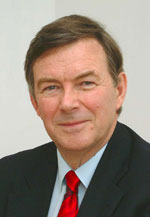
Air Marshal Timothy Garden, Baron Garden,, FRUSI, FCGI was a senior commander in the Royal Air Force (RAF) who later became a university professor and a Liberal Democrat politician.

The Naval Service Reserve (NSR) is the reserve force of the Irish Naval Service. It is one of two elements of the Reserve Defence Forces (RDF) of the Irish Defence Forces, the other element being the Army Reserve (AR). The NSR was established on 1 October 2005 to replace and reorganise the previous naval reserve organisation, An Slua Muirí, which in turn replaced the fore-runner Maritime Inscription founded in 1940 to act as a Port Control authority during The Emergency (WWII). Originally formed at Dublin's Alexandra Basin, its headquarters was in Portobello barracks, now known as Cathal Brugha Barracks.

The Armed Forces Flag Day or the Flag Day of India is a day dedicated to honouring the soldiers and veterans of India's armed forces. It has been observed annually in India on December 7 since 1949.
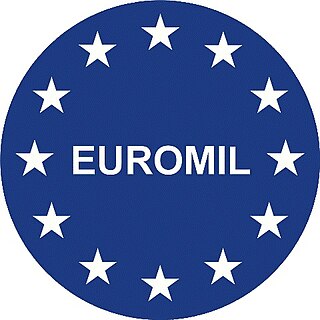
The European Organisation of Military Associations and Trade Unions (EUROMIL) is a politically independent, non-profit umbrella organisation of free, democratic associations of military personnel in Europe.
Douglas Young FRSA TD DL WS, also known as Doug Young, is a former Scottish solicitor and reserve British Army officer.

The Service Personnel and Veterans Agency (SPVA) was an executive agency of the UK Ministry of Defence. The SPVA provided personnel, pensions, welfare and support services to members of the UK Armed Forces, veterans and their dependents. It was formed on 2 April 2007 by merging the former Armed Forces Personnel Administration Agency (AFPAA) with the Veterans Agency. The agency merged in turn with Defence Business Services (DBS) on 1 April 2014.

In the United Kingdom, the term military police refers to the three branches of the service police. Often, the term 'military police' is considered synonymous with the Army's Royal Military Police, but in fact, has a wider context. There are a number of civilian police forces whose role is to police other parts of the Defence Estate in the UK and overseas, but such forces are not correctly referred to as military police.

The Sri Lanka Armed Forces is the overall unified military of the Democratic Socialist Republic of Sri Lanka encompassing the Sri Lanka Army, the Sri Lanka Navy, and the Sri Lanka Air Force; they are governed by the Ministry of Defence (MoD). The three services have around 346,700 active personnel; conscription has never been imposed in Sri Lanka. The Sri Lanka Coast Guard is also under the purview of the Ministry of Defence and its members are all from the Sri Lanka Navy.
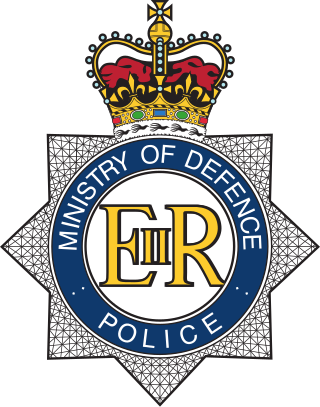
The Ministry of Defence Police (MDP) is a civilian special police force which is part of the United Kingdom's Ministry of Defence. The MDP's primary responsibilities are to provide armed security and counter terrorism services to designated high-risk areas, as well as uniformed policing and limited investigative services to Ministry of Defence property, personnel, and installations throughout the United Kingdom. The MDP are not military police and should not be confused with the Royal Military Police or any other British Service Police. Service personnel often refer to the MDP by the nickname "MOD plod".

The Armed forces in Wales refers to military bases and organisation in Wales or associated with Wales. This includes servicemen and women from Wales and Welsh regiments and brigades of the British Armed Forces.

















